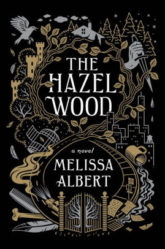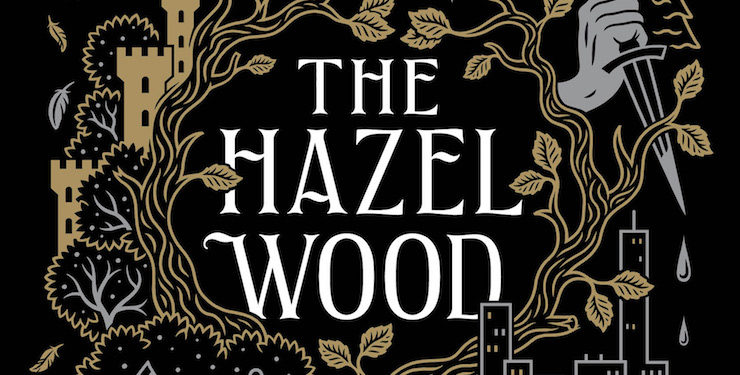For as long as Alice Proserpine can remember, she and her mother, Ella, have been on the run. From what, Alice isn’t sure, but bad luck and ill-timing seem to follow them like a shadow. Ella never speaks of her reclusive mother, Althea, save scattered references to the once-famous but now lost book she wrote called Tales from the Hinterland. When Alice’s grandmother dies unexpectedly, Ella does the unthinkable: she settles down and gets married. Things are good for a while, longer than ever before, but once again darkness seeps in. One day, violence lands on their door and Ella vanishes, leaving Alice lost and frightened and full of fury.
With the help of Hinterlands superfan Ellery Finch, the only friend she has, the two teens set off to find Althea’s hidden estate known only as the Hazel Wood. All the while, sinister forces track their every move. The closer Alice and Finch get to her past, the more secrets are revealed. The Hinterlands may not be just a fairy tale after all…
Buy the Book


Alice isn’t the easiest character to like. She’s irritable, coarse, and often downright unpleasant. She has spent her life on the run, unable and unwilling to give her heart to someone when she knows she’ll just have to take it back a few days or weeks or months later. It’s tricky to parse out her personality. Part of her hard-heartedness is a reaction to her unstable childhood, part is caused by plot-related reasons I can’t get into for spoilers, and the rest is the result of a naturally tough personality. She’s too often intensely angry and emotionally cruel, yet if you dig deep enough there’s a little girl longing for something she doesn’t think she deserves: love. Not romance, but the love of a friend, of family, of self.
If you’ve ever been abandoned by one parent and raised solely by the other you’ll recognize Alice’s simultaneous yet contradictory feelings of being desperate for closeness yet reluctant to trust. I’ve lived that ambivalence of needing attention, acceptance, and affection yet fearing those same feelings. As a young adult I wasn’t nearly as harsh to others as Alice, but I was just as angry and hurt and lonely. Alice knows she’s behaving badly—“The feeling of knowing you’re being an asshole is as bad as feeling wronged, but without the satisfaction”—but as I can attest to all too well, recognizing your behavior and actually changing it are two very different things.
Now, of course I’m layering my own personal experiences over Alice’s story. She wasn’t abandoned by her father (he isn’t in the book at all). Instead, she and Ella constantly abandon everyone else. But that thread is still there, the emptiness and the yearning. The knowing that there’s only one person in the world who truly cares about you, the feeling of being let down by that person, the knowledge that the person you want to know the most doesn’t care about you at all. The specifics differ between Alice and me, but the end result is the same. That being said, as familiar as Alice’s state is to me, I can totally see how others might reject it.
Melissa Albert makes the reader work for a connection to Alice. And frankly, I don’t see a problem with never warming up to her. True antiheroes are rare in young adult fiction, especially first person antihero POV. Women antiheroes across any medium are just as rare. The audience is trained to if not like the main character then at least find something appealing about them, like an endearing quirk or a genius brain or rakishly tousled hair, etc. And when you break it down by gender, the reactions are even more divergent. Male antiheroes rake in praise for their dangerous behavior, but female antiheroes are often subject to debate about their likeability. No one has ever called Walter White a bitch, but all Annalise Keating has to do is exist and that word gets hurled from all corners. Point is, maybe we aren’t supposed to like Alice. Or, more specifically, maybe it doesn’t matter if we do or not.
Alice has more than a few charming qualities—she’s not all violence and viciousness, otherwise she’d be a villain—but those charms aren’t there to excuse or make up for her poor behavior. Same goes for the novel itself, for that matter. Albert’s novel, Althea’s fairy tales, and the fairy world they inspired are dark and forbidding. There are no happy endings in the Hinterlands or The Hazel Wood. Alice and Albert offer no sugar-coating or neat little bows. Consequences abound, but not so much resolutions.
Like with Alice, readers will either like or dislike The Hazel Wood. The very elements that will turn many people off—the glacial pace, the mercurial main character, the lack of resolution for some subplots and characters—will work for plenty of others. Other aspects, such as the relative lack of diversity (there’s only one POC and two queer characters in a sea of cis, able-bodied, white people) and some of the more insensitive words Albert puts in Alice’s mouth, are harder to swallow, even for me. But overall it’s a killer hook with an evocative setting and compelling if complicated characters.
Personally, I thought The Hazel Wood was superb. I relished every page from first to last. Alice’s adventures had me hooked, line and sinker. Albert’s novel is haunting and creepy, a story of blood and lies and betrayal wrapped around a skeleton of heartache and loss. Albert is a brilliant writer, imbuing her novel with gorgeous lines like “The sun was vast and low and not so bright that I couldn’t make out something happening in the fire of its surface, the tracings of a story so distant I’d never read it,” and “The air smelled like crushed grass and chlorine, with the held-breath quiet of the hottest day of summer.” The tale may be familiar, but The Hazel Wood is in a world unto itself.
Fans of Grimm’s fairy tales, blood-soaked folklore, Seanan McGuire’s Wayward Children series, would do well to pick up The Hazel Wood, but so would regular readers eager for an amazing new novel to sink their teeth into. There’s a reason the novel already sold its film rights (though I think it would be much better as a TV show on a streaming service). We’re barely into 2018 and it’s already secured a spot in my top 10. Plus, that cover … oh my goodness is it gorgeous! Yeah, The Hazel Wood is awesome on all fronts.
The Hazel Wood is available from Flatiron Books.
Alex Brown is a YA librarian by day, local historian by night, pop culture critic/reviewer by passion, and QWoC all the time. Keep up with her every move on Twitter, check out her endless barrage of cute rat pics on Instagram, or get lost in the rabbit warren of ships and fandoms on Tumblr.










